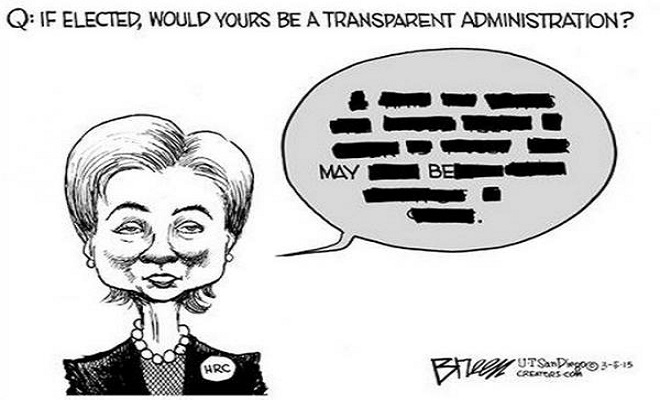 Zero Hedge
Zero Hedge
NWO
“There Are Huge Gaps” In Clinton’s Email Release, Benghazi Probe Chief Blasts
by Tyler Durden, via Zero Hedge.com:
“There are gaps of months and months and months,” exclaims Rep. Trey Gowdy (who leads the committee investigating Hillary Clinton’s handling of the Benghazi attack in September 2012) as the ‘transparent’ release of Clinton’s email includes no emails at all from a seemingly critical Tripoli visit (where she has been photographed using her Blackberry). Gowdy ranted on CBS “Face The Nation” yesterday that “it strains credibility to believe if you’re on your way to Libya to discuss Libyan policy that there is not a single document to turn over to Congress.” Clinton, for now, is staying very quiet on this matter…
Huge gaps exist in the emails former U.S. Secretary of State Hillary Clinton has provided to a congressional committeeinvestigating the 2012 attack on a U.S. consulate in Benghazi, Libya, the panel’s chairman said on Sunday.
Republican Representative Trey Gowdy said his committee lacked documentation from Clinton’s trip to Libya after the attack despite a popular photo image of her using a handheld device during a flight to that country.
“We have no emails from that day. In fact we have no emails from that trip,” said Gowdy, who heads the committee in the U.S. House of Representatives. “There are huge gaps.”
Widely considered the frontrunner for the 2016 Democratic presidential nomination, Clinton used a private email account for all official business as President Barack Obama’s secretary of state from 2009 to 2013.
Republicans have scrutinized Clinton’s actions over the Benghazi attack in which Ambassador Chris Stevens and three other people were killed. The private email disclosure, published in The New York Times last week, raised Republican concerns about Clinton’s commitment to transparency.
As NYTimes adds, Mr. Gowdy said that he was interested only in communications relating to Benghazi, but that Mrs. Clinton’s evasiveness on the matter was wrong.
“It’s not up to Secretary Clinton to decide what’s public record and what’s not,” he said….
“I think at the end of the day this will just be regarded as a slight hiccup, a small bump in the road six months from now,” Mr. Schumer told CBS. “The bottom line is she’s a national figure, a potential presidential candidate. People are going to shoot at her.”
And here is SNL’s take… which seems far too prescient… Impersonating Mrs. Clinton sitting on a couch, the comedian Kate McKinnon said the contents of her email were no big deal.
“Those emails are clean as a whistle,” she said. “This is not how Hillary Clinton goes down.”
1. Did anyone give Clinton the green light to use personal email in 2009 and was the issue discussed when she was leaving the department?
Clinton defenders have repeatedly pointed to past secretaries of state who used personal email accounts and have argued that no laws or rules were violated because they were fuzzy until recently. But none of the former secretaries from the email era used personal accounts almost exclusively as Clinton did during her tenure.
The department, as POLITICO previously reported, has also had a “general policy” against the routine use of personal email since 2005, raising questions about the origins of the arrangement that allowed Clinton to rely on her personal account. While a 2012 State inspector general’s report called the policy “clear cut,” State officials now insist it applied only to information designated as sensitive. Still, Clinton’s practice seems to be in tension with the Obama administration’s professed focus on transparency. (President Barack Obama told CBS News this weekend he learned of Clinton’s use of personal email the “same time everybody else learned it” through news reports.)
If the department officials were aware of Clinton’s personal email use, presumably, there was also a discussion when Clinton was leaving the department about preserving her email records. The beginning and end of Clinton’s use of the unofficial account while at the State Department could reveal the reasoning behind her reliance on a private account and explain the time lag between Clinton leaving office and a letter requesting her personal emails for record-keeping.
2. What’s in the emails, and what wasn’t turned over?
The contents of Clinton’s emails and the sensitivity of the information she shared on her personal account will continue to dominate the attacks from Clinton’s critics until the emails have been released.
Cybersecurity experts have raised concern over the security of using Clinton’s personal server for government business, and Republicans have seized on that line of attack. But the State Department has said officials do not believe Clinton used her account to discuss classified information because that information was usually printed out for Clinton and shown to her on paper.
Questions also remain about who precisely decided which of Clinton’s emails were work-related, what standard they applied, and what kinds of records were left out of the 55,000 page set.
“It wasn’t spreadsheets for her daughter’s wedding, but it was anything related to official business,” State spokeswoman Marie Harf said Friday, while acknowledging Clinton’s aides made the decisions about what to fork over and what to hold back.
Even when the contents of many of the emails are finally revealed to the public, a lingering question will go unresolved, especially if the messages are mundane: Why wasn’t the information stored at the State Department from the start?
3. How much did the State Department’s request to former secretaries for additional records last year have to do with Benghazi?
Initially, the State Department maintained that an unusual letter it had sent to former secretaries requesting copies of all work-related emails that they sent or received on private accounts had nothing to do with a House Select Committee on Benghazi’s investigation into the 2012 attacks in Libya. But on Friday, Harf conceded that the committee’s investigation was one of many factors that led the department to issue the request that resulted in Clinton sending the State Department emails she exchanged on her personal account.
“Certainly, that’s a factor, but … as we’ve said now a few times, it was not any one thing that prompted this,” Harf said at a daily briefing. “It would be grossly simplistic to say that any one thing prompted us to send this letter.”
The Benghazi investigation has drawn criticism for months, not just from Democrats but also Republicans who believed House GOP botched the process politically. If the letter were a result of the investigation, it would show gaps in the State Department’s and Clinton’s record-keeping efforts, particularly if the personal emails were collected only when prodded by Congress for an unrelated investigation.
4. What role did Eric Hothem play in all this (and does it matter)?
The mystery man connected to Clinton’s personal email account was revealed last week to be Eric Hothem, a former aide in the Clinton administration who is now a Washington, D.C., stockbroker with J.P. Morgan.
Clinton reportedly used an email domain registered to her home in Chappaqua, New York, and public records indicated “Eric Hoteham” was responsible for setting up the server. Hoteham is now believed to be a garbled version of Hothem, who was also linked to Clinton controversies when the family first left the White House in 2001. Hothem has not spoken to the media since being tied to the server and little is known about his work for the Clintons.
It’s still unclear whether the server was at Clinton’s home, for how long it was set up there and whether the emails were also stored off site. Hothem could provide more information on how any server in the Clinton’s house operated amid the swirling security and logistical questions related to the former secretary’s use of the unofficial account.
5. What are the chances other congressional committees will get involved and obtain and release all 55,000 pages of emails?
Since Congress is not bound by FOIA rules, it could release the 55,000 pages of personal emails Clinton turned over much more quickly and with fewer redactions than the State Department. But the State Department has sent only a fraction of that — roughly 300 emails, totaling 900 pages – to the House committee on Benghazi, which most likely doesn’t have authority to subpoena the full set of emails because it has a narrow jurisdiction.
However, other committees, such as the House Foreign Affairs Committee and Oversight and Government Reform Committee or their Senate counterparts, could get involved and subpoena more of the emails since they have broad jurisdiction over State. There are already some rumblings of the House Foreign Affairs Committee launching an investigation.













